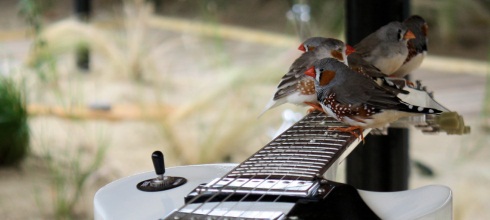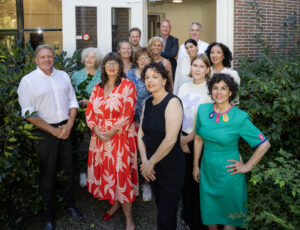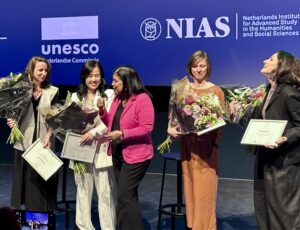Heads Together
“Why do we have music? What is music for, and why does every human culture have it? Is it a uniquely human capability, as language is?” These are some of the questions about the evolution of musicality that Henkjan Honing (Distinguished Lorentz Fellow 2013/14) hoped to address when he brought together leading experts from the fields of musicology, biology and cognition to participate in his workshop What makes us musical animals at the Lorentz Center 7-11 April 2014.
Mechanisms of Musicality
During this intense, interactive week, ideas from various disciplines converged and led to the group concluding that to understand the evolution of music cognition requires identifying which biological and cognitive mechanisms are involved in perceiving, appreciating and making music.
It is virtually impossible to underpin the evolutionary role of musicality as a whole, but a multicomponent perspective on musicality that emphasizes its constituent capacities, development and neural cognitive specificity is an excellent starting point for a research programme aimed at illuminating the origins and evolution of musical behaviour as an autonomous trait.
Another important outcome was that the group proposed effective means to study these mechanisms in both people and animals. Finally Honing’s fellowship at NIAS placed him in an ideal position to consolidate the group’s findings in a joint publication. The resulting Theme Issue entitled Without it no music: cognition, biology and evolution of musicality is published in Philosophical Transactions B, the world’s first journal dedicated to science, published by the Royal Society and celebrating its 350th birthday this year.
“This interdisciplinary meeting of minds is exactly what we envisaged when the Distinguished Lorentz Fellowship was set up” says Paul Emmelkamp, Rector of NIAS. “We hope our next Distinguished Lorentz Fellowships will have a similar impact”.
Distinguished Lorentz Fellowship
The DLF fellowship and workshop are part of the NIAS-Lorentz Program – a collaboration between NIAS and the Lorentz Center, which promotes cutting-edge interdisciplinary research that brings together perspectives from the Humanities and/or Social Sciences on the one hand and the Natural sciences and/or Technological Sciences on the other.




